A 5 year old girl vs. CoderDojo

In early December'16 together with my 5 year old daughter we visited an introductory workshop about the Hello Ruby book and another workshop organized by Coder Dojo Bulgaria. Later that month we also visited a Robo League competition in Sofia. The goal was to further Adriana's interest into technical topics and programming in particular and see how she will respond to the topics covered and the workshops and training materials format in general. I have been keeping detailed notes and today I'm publishing some of my observations.
The events that we visited were strictly for small children and there were mentors who worked with the kids. Each mentor, depending on the event works with up to 4 or 5 children. Parents were not allowed to interfere and I have been keeping my distance on purpose, trying to observe and document as much as possible.
Hello Ruby
Hello Ruby is a small book with colorful illustrations about a girl who embarks on adventures in programming. Adriana considers it a fairy tale although the book introduces lots of IT related terms - Ruby and gems, Firefox, Snow Leopard, Django, etc. For a child these don't necessarily mean anything but she was able to recognize my Red Hat fedora which was depicted on one of the pages.
The workshop itself was the introduction of the Bulgarian translation, which I've purchased, and had the kids build a laptop using glue and paper icons. Mentors were explaining to the children what the various icons mean, that viruses are a bad thing for your computer, what a CPU and computer memory are and everything else in between. A month later when Adriana started building a new paper computer on her own (without being provoked by me) she told me that the colored icons were "information" that goes into the computer!
After the story part of the book there are exercises designed to create analytical thinking. We did only a few in the beginning where she had to create a list of action sequence how to make the bed or get dressed up in the morning, etc. At the time Adriana didn't receive the game very well and was having some troubles figuring out the smaller actions that comprise a larger activity. We didn't follow through with the game.
Code.org
At the second event she was exposed to studio.code.org! At the time we were required to bring a working laptop and a mouse. I had no idea how these were going to be used. It turned out mentors gave each child a training course from code.org according to their age. Adriana started with the Course #1 because she can't read on her own!
At first it seemed to me that Adi was a bit bored and didn't know what to do, staring cluelessly at the screen. Btw this was her first session working with a computer on her own. After a while the mentor came and I guess explained what needs to be done, how the controls work and what the objective of the exercise was. After that I noticed she's working more independently and grew interested in the subject. She had a problem working with the mouse and after 2 days I've nudged her to use the TrackPoint and mouse buttons on a ThinkPad laptop. She uses them with both hands, so am I btw, and is much more adept at controlling the cursor that way. If you are going to teach children how to work effectively with a computer you may as well start with teaching them to work effectively with a track pad!
The courses are comprised of games and puzzles (which she's very good at) asking children to perform a very basic programming concept. For example instruct an angry bird to move left or right by using blocks for each instruction. By the time the workshop was over Adriana had completed 4 levels on her own.
Level 5 introduced a button for step-by-step execution of the program also colloquially known as debugging :). The first few exercises she had no idea what to do with this debugging button. Then the 6th exercise introduced a wrong starting sequence and everything snapped into place.
Level 7 introduced additional instructions. There are move left/right instructions as well as visit a flower and make honey instruction. This level also introduces repeating instructions, for example make honey 2 times. At first that was confusing but then she started to take a notice at the numbers shown on screen and started to figure out how to build the proper sequence of blocks to complete the game. When she made mistakes she used the debugging button to figure out which block was not in place and remove it.
After this level Adi started making more mistakes, but more importantly she also started trying to figure them out on her own. My help was limited to asking questions like "what do you need to do", "where are you at the screen now", "what instructions do you need to execute to get where you want to be".
Level 8 introduces a new type of game, drawing shapes on the screen. The hardest part here is that you need to jump from one node to another sometimes. This is great for improving the child spatial orientation skills.
Level 11 is a reading game in English. You need to instruct a bee to fly across different letters to complete a word shown on the screen. However Adriana can't read much less in English, although she understands and speaks English well for her age. In this case I believe she relied on pattern recognition to complete all exercises in this level. She would look at the target word and then identify the letters on the playing board. Next she would stack instruction blocks to program the movements of the bee towards her goal as in previous exercises.
Level 13 introduces loops. It took Adriana 7 exercises to figure out what a loop is, identify the various elements of it and how to construct it properly. She also said that was amusing to her. Almost immediately she was able to identify the length of the loop by herself and construct loops with only 1 block inside their body. Loops with 2 or more blocks inside their body were a bit harder.
Level 14 introduced nested loops, usually one or more instruction blocks paired
with a loop block, nested inside another loop block. For example:
repeat 3 times(move left, repeat 2 times(move down)). Again it took her about 6
exercises to figure them out. This is roughly at the middle of the level.
Level 16 was quite hard. It had blocks with parameters where you have to type in some words and animal characters will "speak these words" as if in a comic book. I'm not sure if there was supposed to be a text to speech engine integrated for this level but sounds like a good idea. Anyhow this level was not on-par with her skills.
The course completed with free range drawing using instruction blocks and cycles. The image she drew was actually her name where she had to guess how much scribbles the painter needs to do in one direction, then traverse back and go into another direction. She also had to figure out how big each letter needs to be so that it is possible to actually draw it given the game limitations in motion and directions. This final level required lot of my help.
Summary
I have never had any doubts that small children are very clever and capable of understanding enormous amounts of information and new concepts. However I'm amazed by how deep their understanding goes and how fast they are able to apply the new things they learn.
Through games and practical workshops I believe it is very easy to teach children to gain valuable skills for engineering professions. Even if they don't end up in engineering the ability to clearly define goals and instructions, break down complex tasks into small chunks and clearly communicate intentions is a great advantage. So is the ability to analyze the task on your own and use simple building blocks to achieve larger objectives.
I will continue to keep notes on Adi's progress but will very likely write about it less frequently. If you do have small children around you please introduce them to Hello Ruby and studio.code.org and help them learn!
Thanks for reading!
There are comments.
Circo loco 2017

Due to popular demand I'm sharing my plans for the upcoming conference season. Here is a list of events I plan to visit and speak at (hopefully). The list will be updated throughout the year so please subscribe to the comments section to receive a notification when that happens! I'm open to meeting new people so ping me for a beer if you are attending some of these events!
02 February - Hack Belgium Pre-Event Workshops, Brussels
Note: added on Jan 12th
Last year I had an amazing time visiting an Elixir & Erlang workshop so I'm about to repeat the experience. I will be visiting a workshop organized by HackBelgium and keep you posted with the results.
03 February - Git Merge, Brussels
Note: added on Jan 12th
Git Merge is organized by GitHub and will be held in Brussels this year. I will be visiting only the conference track and hopefully giving a lightning talk titled Automatic upstream dependency testing with GitHub API! That and the afterparty of course!
04-05 February - FOSDEM, Brussels
FOSDEM is the largest free and open source gathering in Europe which I have been visiting since 2009 (IIRC). You can checkout some of my reports about FOSDEM 2014, Day 1, FOSDEM 2014, Day 2 and FOSDEM 2016.
I will present my Mutants, tests and zombies talk at the Testing & Automation devroom on Sunday.
UPDATE: Video recording is available here
I will be in Brussels between February 1st and 5th to explore the local start-up scene and get to meet with the Python community so ping me if you are around.
18 March - QA Challenge Accepted 3.0, Sofia
QA: Challenge Accepted is a specialized QA conference in Sofia and most of the sessions are in Bulgarian. I've visited last year and it was great. I even proposed a challenge of my own.
CFP is still open but I have a strong confidence that my talk Testing Red Hat Enterprise Linux the MicroSoft way will be approved. It will describe a large scale experiment with pairwise testing, which btw I learned about at QA: Challenge Accepted 2.0 :).
UPDATE: I will be also on the jury for QA of the year award.
UPDATE: I did a lightning talk about my test case management system (in Bulgarian).
07-08 April - Bulgaria Web Summit, Sofia
I have been a moderator at Bulgaria Web Summit for several years and this year is no exception. This is one of the strongest events held in Sofia and is in English. Last year over 60% of the attendees were from abroad so you are welcome!
I'm not going to speak at this event but will record as much of it as possible. UPDATE: Checkout the recordings on my YouTube channel!
10-12 May - Romanian Testing Conference, Cluj-Napoca
RTC'17 is a new event I found in neighboring Romania. The topic this year is Thriving and remaining relevant in Quality Assurance. My talk is titled Quality Assistance in the Brave New World where I'll share some experiences and visions for the QA profession if that gets accepted.
As it turned out I know a few people living in Cluj so I'll be arriving one day earlier on May 9th to meet the locals.
13-14 May - OSCAL, Tirana
Open Source Conference Albania is the largest OSS event in the country. I'm on a row here to explore the IT scene on the Balkans. Due to traveling constraints my availability will be limited to the conference venue only but I've booked a hotel across the street :).
I will be meeting a few friends in Tirana and hear about the progress of an psychological experiment we devised with Jona Azizaj and Suela Palushi.
Talking wise I'm hoping to get the chance of introducing mutation testing and even host a workshop on the topic.
UPDATE: Here is the video recording from OSCAL. The quality is very poor though.
20-21 May - DEVit, Thessaloniki
This is the 3rd edition of DEVit, the 360° web development conference of Northern Greece. I've been a regular visitor since the beginning and this year I've proposed a session on mutation testing. Because the Thessaloniki community seems more interested in Ruby and Rails my goal is to share more examples from my Ruby work and compare how that is different from the Python world. There is once again an opportunity for a workshop.
So far I've been the only Bulgarian to visit DEVit and also locally known as "The guy who Kosta & Kosta met in Sofia"! Checkout my impressions from DEVit'15 and DEVit'16 if you are still wondering whether to attend or not! I strongly recommend it!
UPDATE: I am still the only Bulgarian visiting DEVit!
22 May - Dev.bg, Sofia
I've hosted a session titled Quality Assurance According to Einstein for the local QA community in Sofia. Video (in Bulgarian) and links are available!
UPDATE: added post-mortem.
01-02 June - Shift Developer Conference, Split
Shift appears to be a very big event in Croatia. My attendance is still unconfirmed due to lots of traveling before that and the general trouble of efficiently traveling on the Balkans. However I have a CFP submitted and waiting for approval. This time it is my Mutation Testing in Patterns, which is a journal of different code patterns found during mutation testing. I have not yet presented it to the public but will blog about it sometime soon so stay tuned.
UPDATE: this one is a no-go!
03-04 June - TuxCon, Plovdiv
TuxCon is held in Plovdiv around the beginning of July. I'm usually presenting some lightning talks there and use the opportunity to meet with friends and peers outside Sofia and catch up with news from the local community. The conference is in Bulgarian with the exception of the occasional foreign speaker. If you understand Bulgarian I recommend the story of Puldin - a Bulgarian computer from the 80s.
UPDATE: I will be opening the conference with QA According to Einstein
17-18 June - How Camp, Varna
How Camp is the little brother of Bulgaria Web Summit and is always held outside of Sofia. This year it will be in Varna, Bulgaria. I will be there of course and depending on the crowd may talk about some software testing patterns.
UPDATE: it looks like this is also a no-go but stay tuned for the upcoming Macedonia Web Summit and Albania Web Summit where yours trully will probably be a moderator!
25-29 September - SuSE CON, Prague
Yeah, this is the conference organized by SuSE. I'm definitely not afraid to visit the competition. I even hope I could teach them something. More details are still TBA because this event is very close to/overlapping with the next two.
28-29 September - SEETEST, Sofia
South East European Software Testing Conference is, AFAIK, an international event which is hosted in a major city on the Balkans. Last year it was held in Bucharest with previous years held in Sofia.
In my view this is the most formal event, especially related to software testing, I'm about to visit. Nevertheless I like to hear about new ideas and some research in the field of QA so this is a good opportunity.
UPDATE: I have submitted a new talk titled If the facts don't fit the theory, change the facts!
30 September-1 October - HackConf, Sofia
HackConf is one of the largest conferences in Bulgaria, gathering over 1000 people each year. I am strongly affiliated with the people who organize it and even had the opportunity to host the opening session last year. The picture above is from this event.
The audience is still very young and inexperienced but the presenters are above average. Organizers' goal is HackConf to become the strongest technical conference in the country and also serve as a sort of inspiration for young IT professionals.
UPDATE: I have submitted both a talk proposal and a workshop proposal. For the workshop I intend to teach children Python and Selenium Automation in 8 hours. I've also been helping the organizers with bringing some very cool speakers from abroad!
October - IT Weekend, Bulgaria
IT Weekend is organized by Petar Sabev, the same person who's behind QA: Challenge Accepted. It is a non-formal gathering of engineers with the intent to share some news and then discuss and share problems and experiences. Checkout my review of IT Weekend #1 and IT Weekend #3.
The topic revolve around QA, leadership and management but the format is open and the intention is to broaden the topics covered. The event is held outside Sofia at a SPA hotel and makes for a very nice retreat. I don't have a topic but I'm definitely going if time allows. I will probably make something up if we have QA slots available :).
October - Software Freedom Kosova, Prishtina
Software Freedom Kosova is one of the oldest conferences about free and open source software in the region. This is part of my goal to explore the IT communities on the Balkans. Kosovo sounds a bit strange to visit but I did recognize a few names on the speaker list of previous years.
The CFP is not open yet but I'm planning to make a presentation. Also if weather allows I'm planning a road trip on my motorbike :).
UPDATE: I've met with some of the FLOSSK members in Tirana at OSCAL and they seem to be more busy with running the hacker space in Prishtina so the conference is nearly a no-go.
14-15 November - Google Test Automation Conference, London
GTAC 2017 will be held in London. Both speakers and attendees are pre-approved and my goal is to be the first Red Hatter and second Bulgarian to speak at GTAC.
The previous two years saw talks about mutation testing vs. coverage and their respective use to determine the quality of a test suite with both parties arguing against each other. Since I'm working in both of these fields and have at least two practical example I'm trying to gather more information and present my findings to the world.
UPDATE: I've also submitted my Testing Red Hat Enterprise Linux the Microsoft way
16-17 November - ISTA Con, Sofia
Innovations in Software Technologies and Automation started as a QA conference several years ago but it has broaden the range of acceptable topics to include development, devops and agile. I was at the first two editions and then didn't attend for a while until last year when I really liked it. The event is entirely in English with lots of foreign speakers.
Recently I've been working on something I call "Regression Test Monitoring" and my intention is to present this at ISTA 2017 so stay tuned.
UPDATE: I didn't manage to collect enough information on the Regression Test Monitoring topic but have made two other proposals.
Thanks for reading and see you around!
There are comments.
Highlights from ISTA and GTAC 2016

Another two weeks have passed and I'm blogging about another 2 conferences. This year both Innovations in Software Technologies and Automation and Google Test Automation Conference happened on the same day. I was attending ISTA in Sofia during the day and watching the live stream of GTAC during the evenings. Here are some of the things that reflected on me:
- How can I build my software in order to make this a perfect day for the user ?
- People are not the problem which causes bad software to exist. When designing software focus on what people need not on what technology is forcing them to do;
- You need to have blind trust in the people you work with because all the times projects look like they are not going to work until the very end!
- It's good to have diverse set of characters in the company and not homogenize people;
- Team performance grows over time. Effective teams minimize time waste during bad periods. They (have and) extract value from conflicts!
- One-on-one meetings are usually like status reports which is bad. Both parties should bring their own issues to the table;
- To grow an effective team members need to do things together. For example pair programming, writing test scenarios, etc;
- When teams don't take actions after retrospective meetings it is usually a sign of missing foundational trust;
- QA engineers need to be present at every step of the software development life-cycle! This is something I teach my students and have been confirmed by many friends in the industry;
- Agile is all about data, even when it comes to testing and quality. We need to decompose and measure iteratively;
- Agile is also about really skillful people. One way to boost your skills is to adopt the T-shaped specialist model;
- In agile iterative work and continuous delivery is king so QA engineers need to focus even more on visualization (I will also add documentation), refactoring and code reviews;
- Agile teams need to give opportunities to team members for taking risk and taking ownership of their actions in the gray zone (e.g. actions which isn't clear who should be doing).
In the brave new world of micro services end to end testing is no more! We test each level in isolation but keep stable contracts/APIs between levels. That way we can reduce the test burden and still guarantee an acceptable level of risk. This change in software architecture (monolithic vs. micro) leads to change in technologies (one framework/language vs. what's best for the task) which in turn leads to changes in testing approach and testing tools. This ultimately leads to changing people on the team because they now need different skills than when they were hired! This circles back to the T-shaped specialist model and the fact that QA should be integrated in every step of the way! Thanks to Denitsa Evtimova and Lyudmila Labova for this wisdom and the quote pictured above.
Aneta Petkova talked about monitoring of test results which is a topic very close to my work. Imagine you have your automated test suite but still get failures occasionally. Are these bugs or something else broke ? If they are bugs and you are waiting for them to be fixed do you execute the tests against the still broken build or wait ? If you do, what additional info do you get from these executions vs. how much time do you spend figuring out "oh, that's still not fixed or geez, here's another hidden bug in the code" ?
Her team has modified their test execution framework (what I'd usually call a test runner or even test lab) to have knowledge about issues in JIRA and skip some tests when no meaningful information can be extracted from them. I have to point out that this approach may require a lot of maintenance in environments where you have failures due to infrastructure issues. This idea connects very nicely with the general idea behind this year's GTAC - don't run tests if you don't need to aka smart test execution!
Boris Prikhodskiy shared a very simple rule. Don't execute tests
- which have 100 % pass rate;
- during the last month;
- and have been executed at least 100 times before that!
This is what Unity does for their numerous topic branches and reduces test time with 60-70 percent. All of the test suite is still executed against their trunk branch and PR merge queue branches!
At GTAC there were several presentations about speeding up test execution time. Emanuil Slavov was very practical but the most important thing he said was that a fast test suite is the result of many conscious actions which introduced small improvements over time. His team had assigned themselves the task to iteratively improve their test suite performance and at every step of the way they analyzed the existing bottlenecks and experimented with possible solutions.
The steps in particular are (on a single machine):
- Execute tests in dedicated environment;
- Start with empty database, not used by anything else; This also leads to adjustments in your test suite architecture and DB setup procedures;
- Simulate and stub external dependencies like 3rd party services;
- Move to containers but beware of slow disk I/O;
- Run database in memory not on disk because it is a temporary DB anyway;
- Don't clean test data, just trash the entire DB once you're done;
- Execute tests in parallel which should be the last thing to do!
- Equalize workload between parallel threads for optimal performance;
- Upgrade the hardware (RAM, CPU) aka vertical scaling;
- Add horizontal scaling (probably with a messaging layer);
John Micco and Atif Memon talked about flaky tests at Google:
- 84% of the transitions from PASS to FAIL are flakes;
- Almost 16% of their 3.5 million tests have some level of flakiness;
- Flaky failures frequently block and delay releases;
- Google spends between 2% and 16% of their CI compute resources re-running flaky tests;
- Flakiness insertion speed is comparable to flakiness removal speed!
- The optimal setting is 2 persons modifying the same source file at the same time. This leads to minimal chance of breaking stuff;
- Fix or delete flaky tests because you don't get meaningful value out of them.
So Google want to stop a test execution before it is executed if historical data shows that the test has attributes of flakiness. The research they talk about utilizes tons of data collected from Google's CI environment which was the most interesting fact for me. Indeed if we use data to decide which features to build for our customers then why not use data to govern the process of testing? In addition to the video you should read John's post Flaky Tests at Google and How We Mitigate Them.
At the end I'd like to finish with Rahul Gopinath's Code Coverage is a Strong Predictor of Test suite Effectiveness in the Real World. He basically said that code coverage metrics as we know them today are still the best practical indicator of how good a test suite is. He argues that mutation testing is slow and only provides additional 4% to a well designed test suite. This is absolutely the opposite of what Laura Inozemtseva presented last year in her Coverage is Not Strongly Correlated with Test Suite Effectiveness lightning talk. Rahul also made a point about sample size in the two research papers and I had the impression he's saying Laura didn't do a proper academic research.
I'm a heavy contributor to Cosmic Ray, the mutation testing tool for Python and also use mutation testing in my daily job so this is a very interesting topic indeed. I've asked fellow tool authors to have a look at both presentations and share their opinions. I also have an idea about a practical experiment to see if full branch coverage and full mutation coverage will be able to find a known bug in a piece of software I wrote. I will be writing about this experiment next week so stay tuned.
Thanks for reading and happy testing!
There are comments.
Women In Open Source
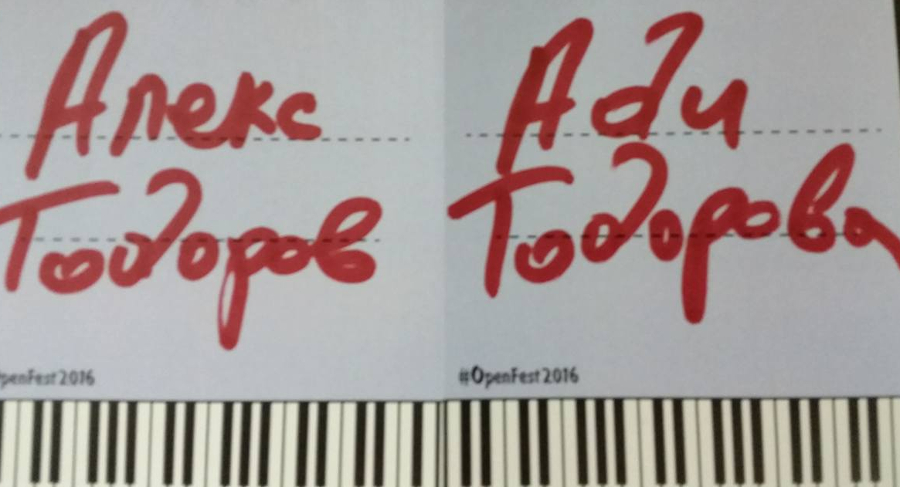
It's been 2 weeks after OpenFest 2016 and I've promised to blog about what happened during the Women in Open Source presentation, which is the only single talk I did attend.
The presenters were Jona Azizaj, whom I met at FOSDEM earlier this year, Suela Palushi and Kristi Progri, all 3 from Albania. I've went to OpenFest specifically to meet them and listen to their presentation.
They started by explaining their background and telling us more about their respective communities, Fedora Women, WoMoz, GNOME Outreach and the Open Labs hackerspace in Tirana. The girls gave some stats how many women there are in the larger FOSS community and what some newcomer's first impressions could be.
Did you know that in 2002 1.1% of all FOSS participants were female, while in 2013 that was 11% ? A 10x increase but of them only 1.5% are developers.
The presentation was a nice overview of different opportunities to get involved in open source geared towards women. I've specifically asked and the girls responded how they first came to join open source. In general they've had a good and welcoming community around them which made it natural to join and thrive.
Now comes the sad part. Instead of welcoming and supporting these girls that they've stood up to talk about their experiences the audience did the opposite. In particular Maya Milusheva from Plushie Games made a very passionate claim against the topic women in tech. It went like this:
- I am a woman
- I am a good developer
- I am a mother
- I am a CEO of a successful IT company
- when I hire I want the best people for my company and they are men
- women simply don't have the required tech skills/level of expertise
- the whole talk about women in open source/diversity is bullshit
- girls need to sit down on their asses and read more, code more, etc.
In terms of successfullness I think I can compare to Maya. I also have a small child, which I regularly take to conferences with me (the badges above). I also have an IT company which generates a comparable amount of income. I also want to hire the best employees for any given project I'm working on. Sometimes it's happened that to be a woman, sometimes not. The point here however was not about hiring more women per se. It was about giving opportunities in the communities and letting people grow for themselves.
** Yes, she has a point but there's something WRONG in coming to listen to a presenter just to tell them they are full of shit! It's very arrogant shouting around and arguing a point about hiring when in fact the entire presentation was not about hiring! It is totally unacceptable, The NY Times writing about apps you develop and behaving like an asshole at public events at the same time! **
I've been there, the crowd telling me I'm full of shit when I've been presenting about new technologies. I've been there being told that my ideas will not work in this or that way, while in fact the very idea of trying and considering a completely different technological approach was what counted. And finally I've been there years later when the same ideas and technologies have become mainstream and the same crowd was now talking about them!
After Maya there was another person who grabbed the microphone and continued to talk nonsense. Unfortunately he didn't state his name and I don't know the guy in person. What he said was along the lines of little boys play with robots, little girls play with dolls. They like it this way and that's why girls don't get involved in the technical field. Also if a girl played with robots she will be called a tomboy and generally have a negative attitude towards her.
It's absolutely clear this guy has no idea what he's talking about. Everyone who has small children around them will agree that they are born with equal mental capacity. It is up to the environment, parents, teachers, etc to shape this capacity in a positive way. I've seen children who taught themselves speaking English from YouTube and children the same age barely speaking Bulgarian. I've seen children who are curious about the world and how it works and children who can't wipe their own noses. It's not because they like it that way, it's because of their parents and the environment they live in.
Finally I'd like to respond to this guy (I was specifically motioned at the conference not to respond) with this
I have a 5 year old girl. She likes robots as much as she likes dolls. She works with Linux and is lucky enough to have one of the two OLPCs laptops in Bulgaria. She plays SuperTux and has already found a bug in it (I've reported it). She's been to several Linux and IT conferences as you can see from the picture above. She likes being taken to hackathons and learning about inspiring stuff that students are doing.
Are you telling me that because we have the wrong idea women can't be good at technology she can't become a successful engineer ? Are you telling me to basically scratch the next 10 years of her life and tell her she can't become what she wants ? Because if you do I say FUCK OFF!
Even I as a parent don't have the power to tell my child what they can do or not do, what they can accomplish or not. My job is to show them the various possibilities that exist and guide and support them along they way they want to go! This is what we as society also need to do for everyone else!
To wrap up I will tell you about a psychological experiment we devised with Jona and Suela. I've proposed to find a male and female student in Tirana and have them pose online as somebody from the opposite sex, fake accounts and all. They've proposed having the same person both act as male or female for the purposes of evening out the tech skills difference. The goal is to see how does the tech community react to their contributions and try to measure how much does their gender being known affect their performance! I hope the girls will find a way to perform this experiment together with the university Psychology department and share the results with us.
Btw I will be visiting OSCAL'17 to check up on that so see you in Albania!
There are comments.
IT Weekend Highlights
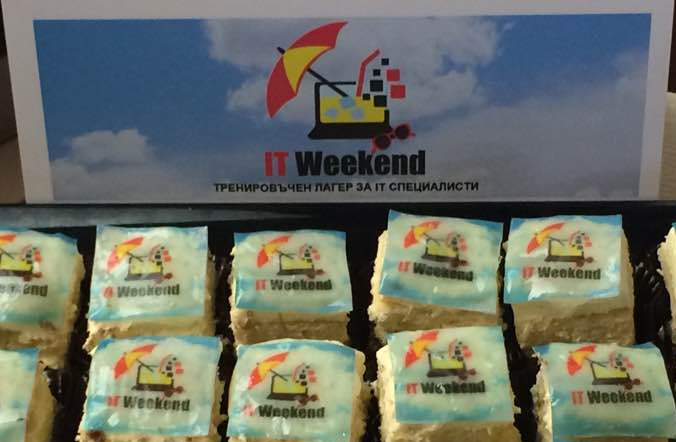
Last weekend I attended the third IT Weekend. It's like a training camp for athletes but for QA engineers. While during the first week the crowd was more in the junior to mid level range now the crowd was more into the senior level range which made for better talks and discussions. The most interesting sessions for me were On-boarding of New Team Members by Nikola Naidenov and Agile Leadership by Bogoi Bogdanov. Here are some of the highlights that I wrote down:
- On-boarding of new team members is very important. You need to have a plan for their first 6 months at the company. This plan needs to have clearly defined tasks and expectations;
- When a person becomes productive for their team/company it means they have been on-boarded successfully;
- A company provided trainer is a good thing but they tend to focus on broader knowledge, they don't cover team specific domain knowledge;
- Some companies provide both technical and business trainers for their teams;
- It is very important to get timely feedback when you are the one providing training. However feedback isn't always easy to get and we don't always receive sincere feedback;
- If the team is swamped with work tasks you need to provide 10-20% of the time for learning and experimenting with new technologies. IMO this is best done by filing tickets in your bug/task tracking system and prioritizing them together with the rest of the tasks;
- It is also important to have an individual training plan for each team member and review this on a regular basis;
- We should strive to use unified terminology and jargon as to not confuse people. IMO it is usually the new hires who are likely to get confused because they are not familiar with the history of the terms used;
In an agile environment we calculate productivity using the formula
Productivity = Effort * Competence * Environment * Motivation^2
There are 3 important factors that drive motivation
- to have a Purpose
- to feel Autonomy
- to be able to achieve Mastery in your skills
It is also important to note that autonomy is not the opposite of alignment as depicted by the image below.
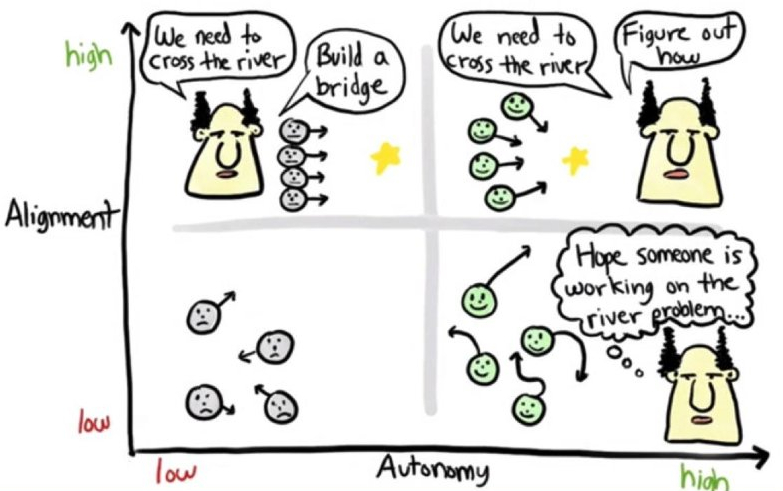
In agile environment control is a function of trust. To be able to trust people we need to give them autonomy, transparency and short feedback loop!
- Manage for the normal treat exceptions as exceptional;
- Failure recovery is more important than failure avoidance;
- Fail fast means learning fast and improving fast.
Thanks for reading and happy testing!
Photo credit: Rayna Stankova
There are comments.
The Passionate Doer

Two weeks ago I visited Startup Factory Ruse and had the opportunity to attend The Passionate Doer – Lessons Learned where Yana Petrova shared her journey with CoKitchen in the past 2 years. The event name comes from The Passionate Programmer book.
A doer is somebody who acts and strives to make changes. When you jump into something new it looks hard and scary at first. With time the important and difficult tasks begin to look like ordinary ones because you gain the experience required for them.
When you are a start-up company you have a limited amount of time and finance to make a break through. Thus it is important to hire the right people, but Yana argues it is more important to quickly dismiss the people who don't fit into your organization. I quite agree with her and the following paragraphs are centered around this idea.
An interesting point Yana makes is about negative reactions and lack of motivation in employees. When a person is lacking motivation they have troubles making logical connections between various tasks and are not able to see the big picture or how their actions or lack thereof affect everything else in the organization. She thinks these are most likely due to problems in our private lives instead of problems at work and as managers we should seek to understand what triggers these negative effects.
Yana believes fatigue makes us vulnerable to negative thoughts so it is best to make important decisions after you've had a good rest. In similar fashion her way to deal with a non-motivated employee is to give them a short break. Then she asks whether or not the employee is ready to return back to work and invest 100% into the job. If not then both parties say good bye to each other. Yana also says that for most problematic employees she'd seen it hasn't been worth it to bring them back and try to improve them.
I've asked Yana if she had some sort of test to keep track of how well a person performs their job. She didn't quite answer but an indicator for under-performance to her is how busy the rest of the team is. Unwillingness to take corrective action, e.g. explore new ways of doing things, acquire more skills or read particular books which will help improve on areas she'd identified, is also a good indicator that the person will have a tendency to under-perform.
Yana says she wouldn't keep an employee who defines their own boundaries and doesn't want to expand them because that person will not go out of their comfort zone. This leaves everyone else tiptoeing around that employee and having to do the job they can't, which puts more stress on the team.
Same approach we should adopt towards customers as well. Get rid of rude and angry customers so that the work flows with less stress.
Yana has been part of many volunteer efforts and her mistake was that she expected everyone to have the same volunteering spirit that she has. In reality it turned out people had trouble managing their own time or lacking the proper communication skills. Not taking responsibility for your actions and not learning from mistakes are other traits she noticed.
At CoKitchen they aim at pairing completely different people with one another so that everyone is able to learn the most from the other person. This is part of their internal mentorship program.
Another interesting book mentioned by a member of the audience was Drive: The Surprising Truth About What Motivates Us. The book reveals the three elements of true motivation:
- AUTONOMY - the desire to direct our own lives;
- MASTERY - the urge to get better and better at something that matters;
- PURPOSE - the yearning to do what we do in the service of something larger than ourselves.
Sounds like an interesting book (from the point of view of the employer) which is definitely going into my reading list.
Sorry if my notes are a bit terse this time, it's been a busy month. I still hope you learned something new from this post. Thanks for reading!
Image credit: Omar Ismail
There are comments.
The 4 Basic Communication Styles
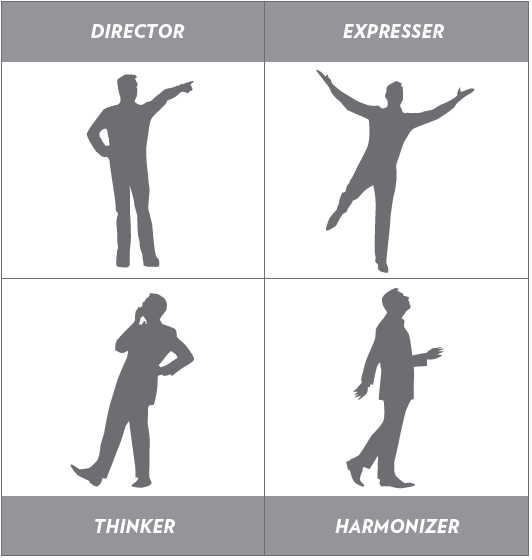
The first GEM Conference in Bulgaria took place on Monday and Tuesday. I missed most of the sessions due to other meetings and tasks but managed to attend a workshop on the topic How to harness the power of influence and communication in entrepreneurship by Plamen Popov and Yassar Markos.
3 Fundamentals for Communication
According to Plamen and Yassar there are 3 key fundamentals for any kind of communication:
- Willingness to pay the price for this communication to happen;
- Flexibility because we need to try different approaches until we reach the desired person in a way they can understand what we're saying;
- Integrity because we always need to be consistent in what we deliver to others so that we always match their expectations.
4 Communication Styles
Then there are 4 basic communication styles based on how formal or informal the communication is and how passive or aggressive it is.
-
Director aka dominant style - they exhibit formal and aggressive communication. Key words for them are results, effectiveness, no small talk, to the point. They dislike wasting their time because they always have something better and more interesting to do. This is why people in this group are the worst listeners. They love conflicts and seek ideas and results.
-
Expresser aka promoting style are dominant/aggressive but informal. They are loud, always speak about themselves, they want public attention and to be unique. They forget details but instead are able to grasp the big picture quite easily. They have lots of energy and passion and love to start new projects and don't complete them.
-
Harmonizer aka supportive style - they exhibit informal and passive communication. They love connections and relationships, they use soft language and look after people and team mates. They don't like conflicts and competitive games. People from this style get impressed when you share personal stories and details with them.
-
Thinker aka analytical style people are formal but non-aggressive. They like to know all the facts and always ask lots of questions because they need to understand the big picture. They need time to understand before they can make a decision. In their lives everything has a particular place. They are prone to postponing tasks until they reach perfection (which they never will).
A person typically has one dominant style and a mix of one or two others. I myself am mostly Director and Expresser aka dominant and promoting with a pinch of Thinker. I mostly lack the Harmonizer traits. However it is more important to know what style the person you are talking to is, not what your personal style is.
When judging the style of others take into account where you stand. A person who is strongly formal and aggressive will view a less formal and mild person as the Expresser or Harmonizer style. However to a 3rd party both of these two persons may appear to be dominated by the Director style.
How to Make a Good Presentation
When presenting to a single person or a small group obviously you have to tailor your presentation according to their communication styles. However when presenting before a large and diverse crowd you need to account for all of them in the following order:
-
Capture the Expresser or promoting style by giving them a promise for something cool and interesting. Because they easily forget details and become distracted you can lose them first.
-
Then capture the Director or dominant style by asserting your authority. State your expertise in the field to establish trust. Also sell them the idea for efficiency because this is the value they need to extract from you.
-
Third comes the Harmonizer or supportive style. They seek open people to connect with. Personal stories and struggles are the best way to engage them.
-
Last comes the Thinker or analytical style. They need to know all the information so you have to give them links and materials for further reading. It is also a good idea to give them the ability to ask you questions later (via email, chat, etc) because they will analyze your ideas and come up with more questions on their own.
I have already started to organize my presentations based on the above 4 key points so hopefully you will see me delivering better talks in the future.
There are comments.
What I Learned from IT Weekend
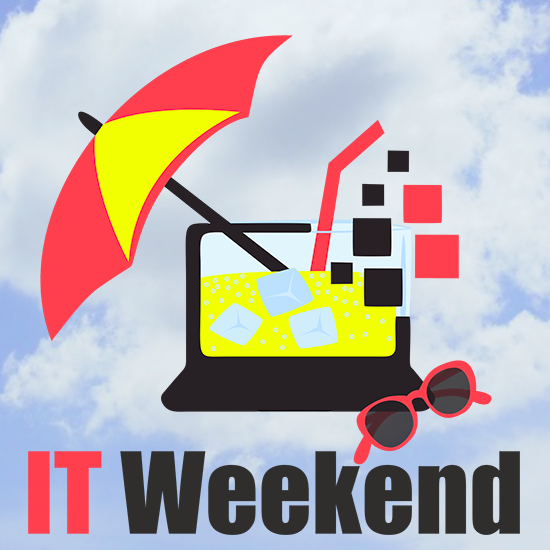
Last week I attended the first IT Weekend in Bulgaria. It's like a training camp for athletes but for QA engineers. There were 20 people attending and the format was very friendly and relaxed. The group had members with various levels of experience and technical skills, also different areas they work in. All presentations are on YouTube. Here's a brief of what happened and what I learned.
I had the honor to present in the first slot and gave a quick introduction to mutation testing. This was my first time giving this talk and I'm not entirely happy with how I've presented it. Also mutation testing is touching a lot on unit tests, programming and source code which in some organizations goes to the devel department. I think mutation testing is harder to understand from people not familiar with it than I initially thought. I'm taking note to improve the way I present this topic to the public.
Yavor Donev gave a good overview of Appium and how to use it on Android. The most important question for me was "Is it possible to utilize the same test suite on Android and iOS, given that the environments are different". With this I mean regardless of how much we try to make the same (native) app on both platforms it will end up differently because the platforms are essentially different. For example there is a different number of physical buttons available.
If we assume that both iOS and Android apps follow the same design and use similar workflow then it should be possible to create a test suite which is platform aware and account for the minor differences. We're also adding another layer of complexity by introducing the requirement that both apps stay in sync with each other and account for the quirks of the foreign platform. Depending on your apps and goals this may not be an easy task!
The one thing I didn't like about Appium is that upstream doesn't care much about version compatibility and they tend to break and change stuff arbitrary between releases. That said if it works, don't update it or otherwise be extremely careful.
I also had a nice chat with Yavor on the topic of career change, learning to program and working with people who have very little coding experience. His approach is to develop a higher level test framework on top of Appium which his team mates can use more easily.
Aneta Petkova's Selenium Grid in Unix Environment is a bit out of my domain. However I took one important lesson: regardless of how great your tools are there are minor details which can make or break your day. In her case these are the physical location of the tests (e.g. which Selenium node runs them) and access to shared resources. Turns out WebDriver doesn't give you this information directly and you need to go through hoops to get it. Her solution was to place the test code on the Grid Hub and provide a shared file system.
The bigger lesson is: whenever you have to design an automated test environment (aka test lab) make sure to evaluate your needs beforehand.
The last talk was a guest appearance by Denitsa Evtimova. She is a QA architect with 16 years of experience and presented the QA strategy at Paysafe group. They have a large monolithic system (legacy code) and have adopted a pyramid style approach to testing. Whenever possible tests are brought down to the lowest level (e.g. unit tests) and not repeated on the higher levels. At the top stand manual testing. Teams are small: 3-4 developers and 2-3 QAs. It is the team responsibility to make sure tests are implemented at the lowest possible level. The process is not strictly enforced and the company relies more on self governance in this aspect. Also everyone on the team can contribute additional tests whenever they see something missing. Test (writing) tasks are all logged in JIRA. They are also small so that everything can be completed in the same day.
The second day was more informal. We did a quick exploratory testing exercise and shared opinions on different test tools. Then the group had a discussion about soft skills and how QA engineers can change the perception of developers about the QA profession (especially in teams where there are many manual testers). The key points are:
- Criticize the software, not the person, e.g. don't blame the person directly;
- Communicate with concrete facts and data, not emotions and perceptions;
- Jokes of the type "how many QA engineers are needed to screw a light bulb" are a problem because they lead to underestimation of the job role;
- Sometimes it is not quite clear (to others) how the QA role contributes to the development of the product and the organization;
- For a QA it is important to be able to give a non-biased opinion and observations on what is happening with the product/process;
- A QA person needs to be very calm. They have to be able to listen to everybody (especially developers) and accept their point of view but at the same time also communicate their own point of view.
- It is important to sit together with developers and observe the problem, brainstorm and propose possible solutions. This also creates a feedback loop where the developer feels empowered because he's part of the process identifying the problem and proposing the best solution;
- In agile teams it is a good idea to rotate people between developer and QA positions. This will help them better understand the job of others, acquire new skills and also bring fresh thinking to the team;
- Quality Assurance is an ungrateful job and only people with very calm and methodical thinking (to follow through and write all possible scenarios) are able to excel in this field. On the other hand developer usually think about the happy path scenarios and strive to make their code work as best as they can;
- By rotating job roles within the team developers will quickly find out that testing is not their field and gain respect towards their QA peers;
- US managers have the habit of telling "good job" to everyone, even for small and routine tasks. In Bulgaria (and maybe elsewhere) we're not used to this. Instead we're used of being scolded when we do something wrong. If everything is good then we don't receive any recognition;
- Using the American "good job" is actually a good thing. Team mates will start performing better over time because they will feel their work is valued and not meaningless, they will feel recognized which will boost morale and productivity.
Thanks for reading and happy testing!
There are comments.
What I Learned from EuRuKo 2016
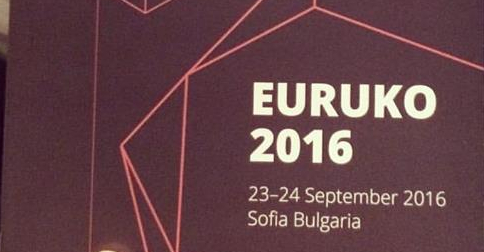
As my frequent readers may know I try to summarize all the conferences and events I go to. This year's EuRuKo inspired me to take a different approach and instead of quickly summarizing the event I will try to highlight what I have learned from it! My intention is to use this as a tool to improve my skills and the work I do. It will probably be a long post so here we go.
Let me say that I don't consider myself a Ruby developer although I do write a small amount of Ruby code. I also don't really consider myself a developer although I have a formal degree in software engineering and do my fair share of open source contributions.
Being different and thinking differently has always been helpful to me in Quality Assurance and this time was no exception. Attending a conference I knew nothing about and meeting with people whose job is totally different than mine turned out to be my greatest experience on the conference circuit this year.
Lesson 1
Get out of the comfort zone, meet new people, exchange ideas and learn! The very fact that I am writing this post not following my usual summary style proves this is working.
Very early during the event I started to notice a recurring theme which grew stronger by the minute. The Ruby community is very open and inclusive to newcomers and they seem to be doing a very good job about on-boarding everyone who wants to learn. I already wrote about Ivan Nemitchenko's experience of organizing remote internships and there are also the Rails Girls local communities, the Rails Girls Summer of Code (didn't know about it) and the various local Ruby communities who pitched their cities to host the next EuRuKo. I really loved this feeling of community. In the broader Linux, Python and QA world I have not seen this being so pronounced.
Lesson 2
Open up (the open source) community even more. Make it easier for newcomers to join! Treat them as human and don't expect them to be like yourself. Do teach and mentor both to help newcomers but also to help yourself become better!
This is mostly on par with my community work but I think I can do better. I will take the time to evaluate what I've been doing in the past and identify areas for improvements. I also encourage my readers and students to send me feedback as well.
I've also learned that junior developers can make meaningful contributions to production grade code when they are given the appropriate set of tasks and guidance. Stephanie Nemeth argued that companies should hire (more) enthusiastic career changers as junior developers because they have very strong motivation for success.
Lesson 3
Re-evaluate how we look at junior developers, especially how we examine and hire them and how we on-board them.
Both lessons 2 and 3 are valid in the open source world and even more so in the corporate world.
I also liked the fact that some of the lightning talks were given by people who had no previous experience in Ruby. @TeamJoda2016 talked about what they did and learn throughout the summer and really cracked the room with their "oh and btw we are looking for a job" as their final slide!
Lesson 4
If you are new/inexperienced at something don't be afraid to try it out. Give it the best you've got and see how it goes. Worst case .... well nothing bad really happens, best case you end up doing the best job in your life. That's also been my personal experience with software testing.
Carina C. Zona's Consequences Of An Insightful Algorithm (old video here) dealt with the ethical responsibilities of us as developers and this is becoming more common with deep learning neural networks.
Lesson 5
We’re able to extract remarkably precise intuitions about an individual. But do we have a right to know what they didn’t consent to share, even when they willingly shared the data that leads us there?
Krissy's The HTT(Pancake) Request made a great analogy of consuming APIs with your customer experience when visiting a restaurant.
Lesson 6
Design APIs (software in general) as if that was a physical product where your customers happiness matters. We see this all the time in our daily jobs and we're guilty of doing it as well. Btw at the moment I'm in the middle of huge refactoring of django-chartit which breaks all backwards compatibility. I guess I will have to re-evaluate my design and approach.
By accident I've made good friends with Alex Georgiev and the folks at Fyber. I liked the fact that at the conference they had couple of people working in QA and we managed to have a nice talk about QA vs developers and the transformation between the two. That also touched on the bigger subject of testers not being able to code and testers not being available for hire.
Lesson 7
Driving people to improve their skills (learn to code, write tests, etc) is possible but needs to come from management, needs clear direction and also a little bit of peer pressure.
After all isn't that what an agile team is supposed to be ?
Now being the able to code, not entirely Ruby ignorant QA guy that I am I was immediately offered several positions in London and Berlin (and no I'm still staying in Sofia). As it turned out good QA engineers with good development skills are in greater demand than developers not only in Sofia but all around the world!
Lesson 8
Fellow QA guys, please do learn to program. Dear developers, please try thinking more like a tester the next time you write code (me included).
Hiring a barista and furnishing your company stand with the best coffee machine you can afford while having an ugly hand written sign saying "MAIN CONFERENCE COFFEE ->" is a marketing stunt that I really love. I'm not sure how well that worked for their hiring but it got them visibility. I'm definitely stealing this one!
Lesson 9
Conference coffee sucks. Provide better one and developers will queue at your stand. To a greater extent - research your target and their needs and provide a product that solves their problem.
What we gave back
#banitsa is a blessing for hang over #euruko
— Monica (@KFMolli) September 24, 2016
indeed Monica it is. Here's the secret sauce
Thanks a lot @euruko to share the recipes for #boza and #banitsa #euruko #bulgary pic.twitter.com/MrkpD4jxve
— Matteo Piotto (@c1p8) September 23, 2016
My personal contribution back was telling Yammer and Deliveroo about mutation testing and pointing them to the right tools and videos on the subject. I wish them good luck and happy testing.
NOTE: I will be speaking about mutation testing at several different events in Bulgaria in the next 2 months so make sure to find me if you want to chat.
There are comments.
What Ivan Learned from Organizing Internships
This is a summary of Ivan Nemytchenko's talk at EuRuKo yesterday (slides here). I'm writing this because that was the best talk both in terms of content and visual presentation I saw at the conference and because it is closely related to my work with HackBulgaria.
The short story is that at some point Ivan was mentoring several junior developers and saw the need to scale this effort so he did a call for interns and got back 60 replies.
What an Intern Gets
- Projects in their portfolio
- Working experience, including team work
- Developing an entire product from idea to production
Ivan wanted to find suitable interns who have basic Ruby on Rails knowledge and who could invest a minimum of 20 hours per week of their time so he devised an aptitude test of 3 parts.
The three part test @inem used to challenge 60 candidates for a Ruby internship. Pretty cool. #euruko pic.twitter.com/OsnN03pXkf
— Tatiana Stantonian (@binaryberry) September 24, 2016
Part 1 is developing basic functionality of the product. Part 2 was adding different user types which require different validation logic, etc. Part 3 was adding "purchasing" logic via external APIs. In Part 3 intentionally there was no code review!
The final result was shit! That was the purpose of the test. The reasoning being that there is no right or wrong way to solve the problems he presented to the interns. Instead he wanted to make them think and decide on a solution. Then feel the pain of their decision. Ivan argues that what made us senior developers are these pains we have experienced at some point in our careers, those fuck-ups that we did in some old project. All of them made us better in our job because we could learn from the mistakes we've made and more importantly understand the consequence of our decisions.
The common mistakes Ivan saw were:
- Ignoring levels of abstraction;
- Using too many gems without knowing or understanding their limitations;
- Gems were treated as the only way to solve a problem. More importantly changing this way was out of the question;
- Interns didn't know about service objects, well even some experienced developers seem to not know that;
- Business logic was all around the place;
- Bad naming all around
The next thing Ivan did was a group hangout code review followed by a short lecture about design patterns, a refactoring session and finally cross code review. At the end the product was delivered as expected.
Following these initial efforts Ivan continued (with even more interns, or the next group of them I think) by asking interns to develop internship automatization, that is a means for the system to distribute tasks based on git commits, tags, etc so it can scale. They've added an admin dashboard and started working on an open source alternative to NewRelic (if I got that correctly). He was also able to enlist 2 more mentors to help him.
Problems Ivan found:
- Not enough mentors and external projects to work on for all of the interns;
- Treating a project as not real (e.g. not a real world product) is a mistake;
- A training project has the same management issues that a real product will have and they need to be resolved in pretty much the same way;
- There was collective irresponsibility from the group of interns. They didn't do what they said they will do;
- There were communication issues between the interns and the lack of enough mentors was an obvious problem.
- There was also lack of motivation.
I'd say these are the typical problems one also sees in almost any teams. It doesn't matter if these are teams of students or teams of developers inside some company.
What a Junior Needs
- A real project to work on;
- A business context, a reason why something should be done and why it needs to be done in a particular way;
- Some visible achievement for their portfolio;
- Team work experience;
- Whole cycle development experience.
Ivan thinks that the aptitude test worked great because his interns were able to find good jobs afterwards but he will change a few things. There will be even more tests and he will reject unfit/bad interns. He will also do call for mentors not only for interns. And he wants to turn mentors' experience into tests as well.
I particularly like the "business context" item. IMO even seasoned developers need to have this if they are expected to create a great product for their company. We're not just coders but sometimes companies forget that!
I am also wondering how can I apply a similar aptitude test in my work (both mentoring at HackBulgaria and otherwise).
How about Senior Developers
- They all have routine tasks;
- and research tasks;
- Nice to have features and
- Low priority features;
- Side project ideas
- Missing features in their favorite open source projects
Senior developers' tasks and desires will have to align with what a junior needs in order for the mentorship to work. As senior devs we often make a mistake and expect everyone else to think the same way we do and act as fast as we do. Ideally senior developers want to have multiple clones of ourselves to work with! I myself have been guilty of that and trying to change.
In the context of a for-profit company the above findings should be taken into deep consideration if you are about to have interns.
After the talk I was lucky to talk to Ivan and tell him more about the training sessions at HackBulgaria. I also proposed to him the sponsorship model which he hasn't considered. He then made a counter offer: ask interns for high payment upfront and let them recoup that based on their progress towards the end.
I am really happy to have heard this presentation and being able to talk to Ivan in person. I also have my notes about my "QA and Automation 101" training at HackBulgaria and I now have a better idea how to go about organizing and summarizing them (will try to publish that soon).
Last but not least, Ivan works at GitLab and promised to look at an issue I personally have so here it is GitLab #7953 :).
Related reading
- My How to hire Software Testers series: parts One, Two and Three;
- RadoRado's How I Became a Better Developer in Bulgarian but please use Google translate;
- Damir Zekic's The Importance of Teaching and Mentoring (from the pov of the mentor) lightning talk at EuRuKo (will link video soon), similar to what Rado says;
- Alex Moldovan's How Outsourcing is Killing Cluj.
There are comments.
Questers Beer'n'Code Day 2.0
Last weekend I've visited Questers Beer'n'Code Day which was an open air mini-conference held at the terrace of their office. As to organization the only drawback was the summer sun which made it impossible to see anything on the screen. Most speakers were OK with that although they wanted to show some code examples.
I have recorded all talks and they are available in my TECH TALKS YouTube play list. You can also hear me asking some questions from behind the camera. All of the talks are in Bulgarian though, so sorry for my English speaking readers.
The afternoon started with Lidiya Georgieva and her talk about clean code and code smells. I find the topic particularly interesting but she didn't go into more details. She said she had used SonarCube but couldn't recommend any other tools, except for the standard lint style ones. I have been using LandScape.io for all Python based code I've been working on recently and I think it is great.
Another talk I found interesting was by my fellow QA Petar Sabev on reporting bugs. It was more of an entry level talk, but still very informative for both less experienced QAs and other technical folks so I definitely recommend it.
The last one, and most interesting, was Bogoi Bogdanov with Scaling Agile. Despite the name he covered some basics about Agile and what it actually is. Afterwards we've stayed and talked for a good 2 hours more. I definitely would like to hear more from him in the future.
A big thanks to Questers for hosting this event and allowing me to record it. Happy watching.
There are comments.
Testing the 8-bit computer Puldin
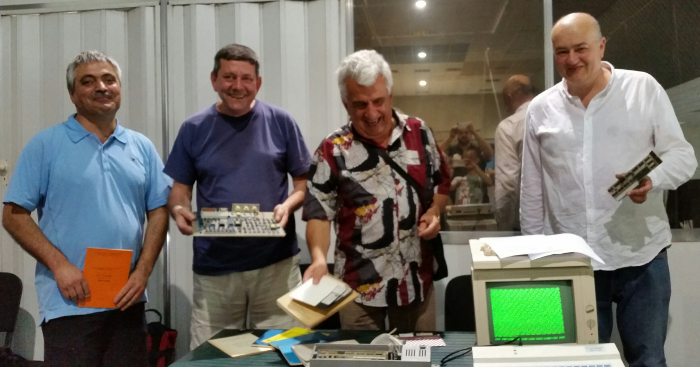
Last weekend I visited TuxCon in Plovdiv and was very happy to meet and talk to some of the creators of the Puldin computer! On the picture above are (left to right) Dimitar Georgiev - wrote the text editor, Ivo Nenov - BIOS, DOS and core OS developer, Nedyalko Todorov - director of the vendor company and Orlin Shopov - BIOS, DOS, compiler and core OS developer.
Puldin is 100% pure Bulgarian development, while the “Pravetz” brand was copy of Apple ][ (Pravetz 8A, 8C, 8M), Oric (Pravets 8D) and IBM-PC (Pravetz 16). The Puldin computers were build from scratch both hardware and software and were produced in Plovdiv in the late 80s and early 90s. 50000 pieces were made, at least 35000 of them have been exported to Russia and paid for. A typical configuration in a Russian class room consisted of several Puldin computers and a single Pravetz 16. According to Russian sources the last usage of these computers was in 2003 serving as Linux terminals and being maintained without any support from the vendor (b/c it ceased to exist).
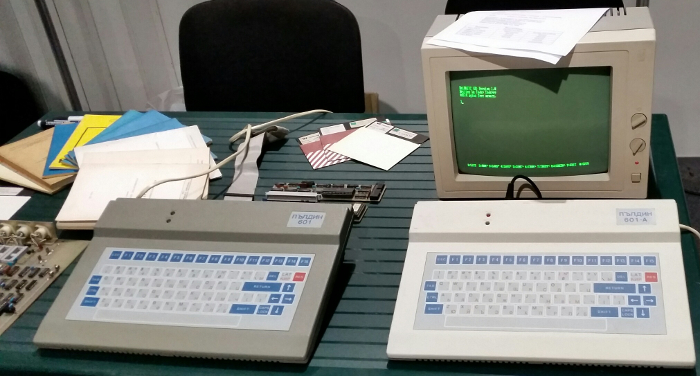
One of the main objectives of Puldin was full compatibility with IBM-PC. At the time IBM had been releasing extensive documentation about how their software and hardware works which has been used by Puldin's creators as their software specs. Despite IBM-PC using faster CPU the Puldin 601 had a comparable performance due to aggressive software and compiler optimizations.
Testing wise the guys used to compare Puldin's functionality with that of IBM-PC. It was a hard requirement to have full compatibility on the file storage layer, that means floppy disks written on Puldin had to be readable on IBM-PC and vice versa. Same goes for programs compiled on Puldin - they had to execute on IBM-PC.
Everything of course had been tested manually and on top of that all the software had to be burned to ROM before you can do anything with it. As you can imagine the testing process had been quite slow and painful compared to today's standards. I've asked the guys if they'd happened to find a bug in IBM-PC which wasn't present in their code but they couldn't remember.
What was interesting for me on the hardware side was the fact that you can plug the computer directly to a cheap TV set and that it's been one of the first computers which could operate on 12V DC, powered directly from a car battery.
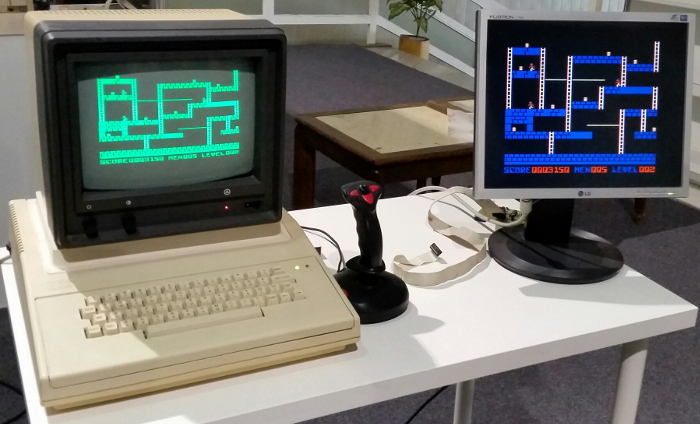
There was also a fully functional Pravetz 8 with an additional VGA port to connect it to the LCD monitor as well as a SD card reader wired to function as a floppy disk reader (the small black dot behind the joystick).
For those who missed it (and understand Bulgarian) I have a video recording on YouTube. For more info about the history and the hardware please check-out Olimex post on Puldin (in English). For more info on Puldin and Pravetz please visit pyldin.info (in Russian) and pravetz8.com (in Bulgarian) using Google translate if need be.
There are comments.
DEVit Conf 2016
It's been another busy week after DEVit conf took place in Thessaloniki. Here are my impressions.
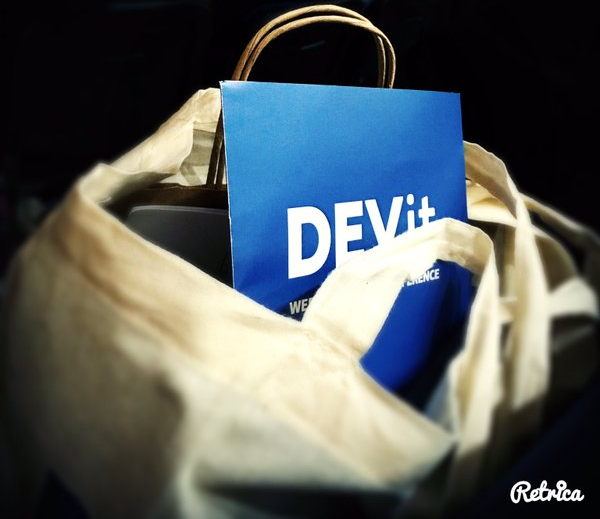
Pre-conference
TechMinistry is Thessaloniki's hacker space which is hosted at a central location, near major shopping streets. I've attended an Open Source Wednesday meeting. From the event description I thought that there was going to be a discussion about getting involved with Firefox. However that was not the case. Once people started coming in they formed organic groups and started discussing various topics on their own.
I was also shown their 3D printer which IMO is the most precise of 3D printers I've seen so far. Imagine what it would be like to click Print, sometime in the future, and have your online orders appear on your desk over night. That would be quite cool!
I've met with Christos Bacharakis, a Mozilla representative for Greece, who gave me some goodies for my students at HackBulgaria!
On Thursday I spent the day merging pull requests for MrSenko/pelican-octopress-theme and attended the DEVit Speakers dinner at Massalia. Food and drinks were very good and I even found a new recipe for mushrooms with ouzo, of which I think I had a bit too many :).
I was also told that "a full stack developer is a developer who can introduce a bug to every layer of the software stack". I can't agree more!
DEVit
The conference day started with a huge delay due to long queues for registration. The fist talk I attended, and the best one IMO was Need It Robust? Make It Fragile! by Yegor Bugayenko (watch the video). There he talked about two different approaches to writing software: fail safe vs. fail fast.
He argues that when software is designed to fail fast bugs are discovered earlier in the development cycle/software lifetime and thus are easier to fix, making the whole system more robust and more stable. On the other hand when software is designed to hide failures and tries to recover auto-magically the same problems remain hidden for longer and when they are finally discovered they are harder to fix. This is mostly due to the fact that the original error condition is hidden and manifested in a different way which makes it harder to debug.
Yegor made several examples, all of which are valid code, which he considers bad practice. For example imagine we have a function that accepts a filename as parameter:
def read_file_fail_safe(fname):
if not os.path.exists(fname):
return -1
# read the file, do something else
...
return bytes_read
def read_file_fail_fast(fname):
if not os.path.exists(fname):
raise Exception('File does not exist')
# read the file, do something else
return bytes_read
In the first example read_file_fail_safe returns -1 on error. The trouble is
whoever is calling this method may not check for errors thus corrupting the
flow of the program further down the line. You may also want to collect metrics and
update your database with the number of bytes processed - this will totally
skew your metrics. C programmers out there will quickly remember at least
one case when they didn't check the return code for errors!
The second example read_file_fail_fast will raise an exception the moment
it encounters a problem. It's not its fault that the file doesn't exist and
there's nothing it can do about it, nor is its job to do anything about it.
Raising an exception will surface back to the caller and they will be notified
about the problem, taking appropriate actions to resolve it.
Yegor was also unhappy that many books teach fail safe and even IDEs (for Java) generate fail safe boiler-plate code (need to check this)! Indeed it is me who asks the first question Are there any tools to detect fail safe code patterns? and it turns out there aren't (for the majority of cases that is). If you happen to know such a tool please post a link in the comments below.
I was a bit disappointed by the rest of the talks. They were all high-level overviews IMO and didn't go deep technical. Last year was better. I also wanted to attend the GitHub Patchwork workshop but looking at the agenda it looked like this is for users who are starting with git and GitHub (which I'm not).
The closing session of the day was "Real time front-end alchemy, or: capturing, playing, altering and encoding video and audio streams, without servers or plugins!" by Soledad Penades from Mozilla. There she gave a demo about the latest and greatest in terms of audio and video capturing, recording and mixing natively in the browser. This is definitively very cool for apps in the audio/video space but I can also imagine an application for us software testers.
Depending on computational and memory requirements you should be able to record everything the user does in their browser (while on your website) and send it back home when they want to report an error or contact support. Definitely better than screenshots and having to go back and forth until the exact steps to reproduce are established.
There are comments.
Bulgaria Web Summit 2016 Report & Videos
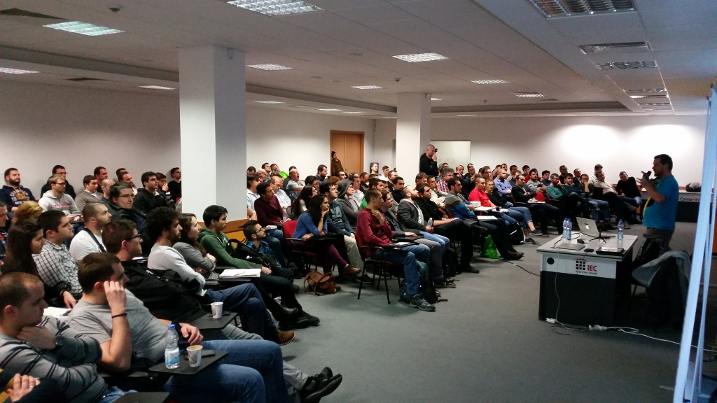
Hello everyone, this year I've been moderator at Bulgaria Web Summit again. Here is a quick report of the even as seen from the room I was at.
The morning sessions were dominated by database topics including MariaDB, RocksDB and MammothDB. The MariaDB talk was particularly strong while the rest were with average attendance.
In the afternoon we switched to DevOps and Docker and the room exploded. There were people sitting on the ground and standing around the walls. There was not enough oxygen for everyone in the room.
I have recorded all of the talks from this room. Most are in English. You can watch them at my YouTube channel and I hope to see you next year in Sofia.
There are comments.
FOSDEM 2016 Report
Hello everyone, this year I've been to FOSDEM again. Here is a quick report of what I did, saw and liked during the event.
Day 0 - Elixir & Erlang
Friday started with an unexpected shopping trip. The airline broke
my luggage and I had to buy a replacement. The irony is that just before taking off
I saw a guy with an
Osprey Meridian
and thought how cool that was. The next day I was running around Brussels to
find the exact same model! I also searched to buy the book
Teach Your Child How to Think
by Edward De Bono but all 4 bookstores I checked were out of stock.
With the luggage problem solved I headed to BetaCowork for Brussels Erlang Factory Lite where I learned a bit about Erlang and Elixir. I also managed to squeeze a meeting with Gilbert West talking about open source bugs.
I found particularly interesting the Elixir workshop and the talk Erlang In The Wild: A Governmental Web Application by Pieterjan Montens. Later I've managed to get a hold of him and talk some more about his experiences working for the government. As I figured out later we are likely to have mutual friends.
BetaCowork was hosting FOSDEM related events during the entire week. There was a GNOME event and the Libre Office Italian team was there as well. Next time definitely worth a longer visit.
Friday night was reserved for a dinner with the Red Hat Eclipse team and a fair amount of beer at Delirium afterwards where I've met my friend Giannis Konstantinidis and the new Fedora Ambassador for Albania - Jona Azizai.
All-in-all pretty good Friday!
Day 1 - Testing and Automation
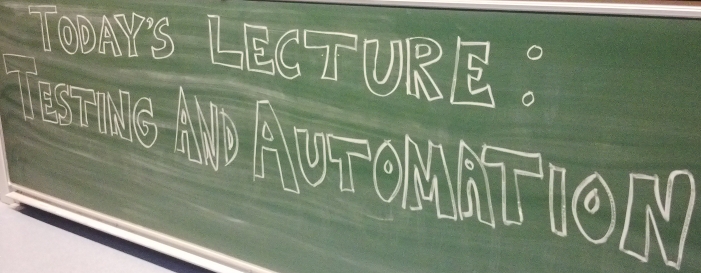
FOSDEM was hosting the Testing and automation devroom again. I've spent the entire Saturday there.
Definitely the most interesting talk was Testing interoperability with closed-source software through scriptable diplomacy which introduced Frida. Frida is a testing tool which injects a JavaScript VM into your process and you can write scripts driving the application automatically. It was designed as means to control closed source software but can definitely be used for open source apps as well.
I've talked to both Karl and Ole about Frida and my use-case for testing interactive terminal programs. That should be easy to do with Frida - just hook into the read and write functions and write some JavaScript or Python to run the test. Later we talked about how exactly Frida attaches to the running process and what external dependencies are needed if I'm to inject Frida into the Fedora installation environment.
In Testing embedded systems Itamar Hassin talked about testing medical devices and made a point about regulation, security and compliance. Basically you are not allowed to ship non-application code on production system. However that code is necessary instrumentation to allow external integration testing. I suspect most developers and QA engineers will never have to deal with so strict regulations but that is something to have in mind if you test software in a heavily regulated industry.
Testing complex software in CI was essentially a presentation about cwrap which I've seen at FOSDEM 2014. It touched the topic from a slightly different angle though. Tests in any open source project should have the following properties
- Be able to execute without the need of a complex environment;
- Enable full CI during code review (dependent on previous property);
- Be able to create complete integration tests.
The demo showed how you can execute Samba's test suite locally without preparing a domain controller for example. This helps both devel and external contributors. Now contrast this with how Red Hat QE will do the testing - they will create a bunch of virtual and bare metal machines, configure all related services and then execute the same test scripts to verify that indeed Samba works as expected.
Btw I've been thinking what if I patch cwrap to overwrite read and write ? That will also make it possible to test interactive console programs, wouldn't it?
Jenkins as Code by Marcin and Lukasz was a blast. I think there were people standing alongside the walls. The guys shared their experience with Jenkins Job DSL plugin. The plugin is very flexible and powerful, using Groovy as its programming language. The only drawback is that it is sometimes too complex to use and requires a steep learning curve. Maybe Jenkins Job Builder is better suited if you don't need all that flexibility and complexity. I've met both of them afterwards and talked a bit more about open source bugs.
At Saturday evening I've visited a panel discussion about the impact of open source on the tech industry at Co.Station organized by The Startup Bus. There was beer, pizza, entrepreneur networking and talking about startups and open source. Do I need to say more? I will post a separate blog post about the interesting start-ups I've found so stay tuned.
Day 2 - Ping-pong with BBC Open Source
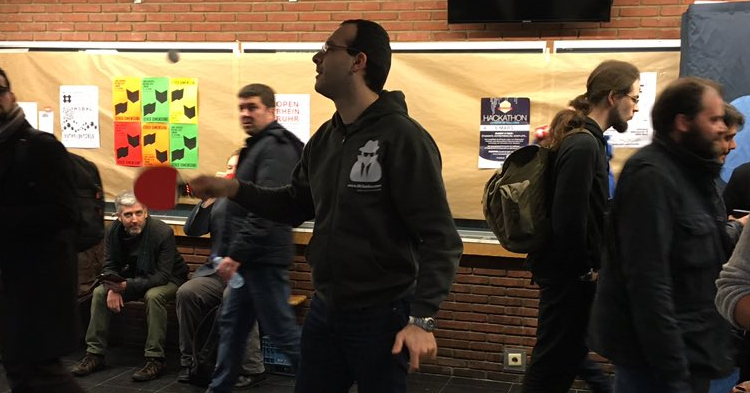
Sunday was my lazy day. I've attended a few talks but nothing too interesting. I've managed to go around the project stands, filed a bug against FAS and scored the highest ping-pong score for the day at the BBC Open Source stand.
BBC has a long history of being involved with education in the UK and the micro:bit is their latest project. I will love to see this (or similar) delivered by the thousands here in Bulgaria so if you think about sponsoring let me know.
Accidentally I met Martin Sivak - a former Anaconda developer whom I've worked with in the past. He is now at the Virtualization Development team at Red Hat and we briefly talked about the need for more oVirt testing. I have something in mind about this which will be announced in the next 2 months so stay tuned.
There are comments.
OpenFest 2015 Impressions
This past weekend I've attended OpenFest in Sofia. I have mixed feelings about this year's event. Although I was so tired that I slept through the entire Monday I find some of the presentations not so interesting.
Day One
On the first day I've tried to attend the talk about The Yocto Project by Leon Anavi and Radoslav Kolev. The room was full and I couldn't get in so I watched some of it outside using the live streaming. Next was Building Universal Applications with Angular 2 by Minko Gechev followed by Free And Open Source Software In European Public Administrations by Gijs Hillenius.
Overall impression from these talks was good. They were interesting to me and I liked the way they were presented.
Afterwards I've spend a good hour and more talking to Gijs, catching up on a long overdue email thread about FOSS usage in Bulgarian public administrations. It's always nice to put a face on the email address :). The outcome of this is that I'll have to forward him quite a lot of local contacts. Also my previous article 10 steps to migrate your closed software to open source is now available at OSOR's website.
Day Two
On day two I had quite a few people to talk to but managed to attend couple of presentations. In the main room First Lessons in Control Theory by Hiro Asari and at the end Collaboration In Open Source - How Does It Really Work? by Otto Kekäläinen. I am quite disappointed by both, the challenge level wasn't the one I've expected.
Hiro's subject is interesting but IMO he merely scratched the surface. The first half of the presentation was an introduction in the field and as far as I could tell most of the people left in the room didn't need it. The most interesting part was probably the last 5-10 minutes.
For Otto's presentation I had the expectation it would be interesting stories and failures from working with the community. Instead it was an introduction why and how open source communities work.
That said both presentations are suitable for inexperienced public, folks who are new to open source or IT in general. For folks like me, who have been working for 10 years in the open they weren't so interesting. I'm not against entry-level presentations but at least they have to be properly annotated as such.
The other presentation I've attended on day two was Education 3.0 by Ivan Gospodinov. This was a non-technical talk which conflicted with the lightning talks and I've missed mine. I liked this one though.
General
This year the event was held at a new venue which was a pleasant change. I've heard there were more people attending since previous years yet it seemed there is less seating capacity at the venue.
The after-party however was very good and just before leaving something amazing happened to me. A guy comes to me and asks if I'm atodorov. Obviously I am. Then he says he's my co-worker Vladimir Ralev from Red Hat. Mind you we've talked many times on IRC but not once seen in person.
There are comments.
Open Data Event Coming to Sofia
Open Data and Intelligent Government is the name of upcoming event organized by Sofia Tech Park on July 14th.
The (preliminary) topics for this event are:
- Government vision for opening data;
- Presentation of national platform for open data;
- Legal aspects of open data;
- Presentation of Bulgarian open data portal;
- Europe and open data;
- Open, coordinated e-government for citizens and business;
- What has already been done by municipalities in Bulgaria;
- Strategy of Sofia municipality for open data;
- Upcoming open data programming contest organized by Sofia municipality.
I will also be participating in this event by covering two topics I'm close to:
- Entrepreneurship and open data - sharing my limited experience with Difio and processing open data;
- Technical tips for successful open data hackathon - sharing my observations as a mentor at HackFMI and giving some recommendations which will help the alleged open data contest make a difference not being just another dull event organized by governmental agencies.
So far other confirmed speakers are Rado from HackBulgaria/ HackFMI and Obshtestvo.bg which are working in the field of open government and open data.
I'm also in touch with the event organizers and helping a little bit with the program. If you're interested in speaking please get in touch with me ASAP.
There are comments.
DEVit Conf 2015 Impressions
It's been a busy week after DEVit conf took place in Thessaloniki. Here are my impressions.
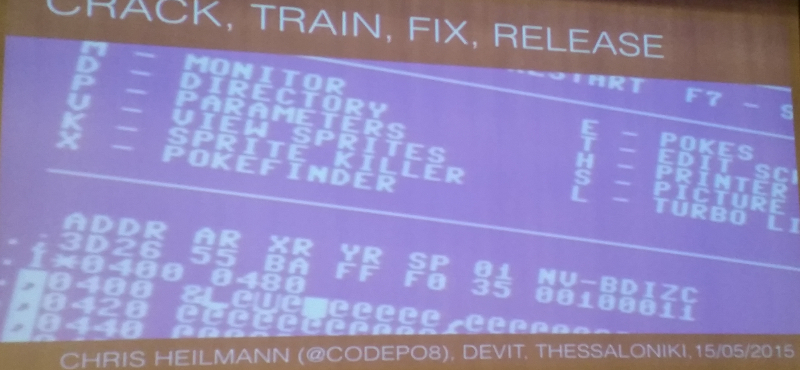
Sessions
I've started the day with the session called "Crack, Train, Fix, Release" by Chris Heilmann. While it was very interesting for some unknown reason I was expecting a talk more closely related to software testing. Unfortunately at the same time in the other room was a talk called "Integration Testing from the Trenches" by Nicolas Frankel which I missed.
At the end Chris answered the question "What to do about old versions of IE ?". And the answer pretty much was "Don't try to support everything, leave them with basic functionality so that users can achieve what they came for on your website. Don't put nice buttons b/c IE 6 users are not used to nice things and they get confused."
If you remember I had a similar question to Jeremy Keith at Bulgaria Web Summit last month and the answer was similar:
Q: Which one is Jeremy's favorite device/browser to develop for.
A: Your approach is wrong and instead we should be thinking in terms of what features are essential or non-essential for our websites and develop around features (if supported, if not supported) not around browsers!
Btw I did ask Chris if he knows Jeremy and he does.
After the coffee break there was "JavaScript ♥ Unicode" by Mathias Bynens which I saw last year at How Camp in Veliko Tarnovo so I just stopped by to say hi and went to listen to "The future of responsive web design: web component queries" by Nikos Zinas. As far as I understood Nikos is a local rock-star developer. I'm not much into web development but the opportunity to create your own HTML components (tags) looks very promising. I guess there will be more business coming for Telerik :).
I wanted to listen to "Live Productive Coder" by Heinz Kabutz but that one started in Greek so I switched the room for "iOS real time content modifications using websockets" by Benny Weingarten-Gabbay.
After lunch I went straight for "Introduction to Docker: What is it and why should I care?" by Ian Miell which IMO was the most interesting talk of the day. It wasn't very technical but managed to clear some of the mysticism around Docker and what it actually is. I tried to grab a few minutes of Ian's time and we found topics of common interest to talk about (Project Atomic anyone?) but later failed to find him and continue the talk. I guess I'll have to follow online.
Tim Perry with "Your Web Stack Would Betray You In An Instant" made a great show. The room was packed, I myself was actually standing the whole time. He described a series of failures across the entire web development stack which gave developers hard times patching and upgrading their services. The lesson: everything fails, be prepared!
The last talk I visited was "GitHub Automation" by Forbes Lindesay. It was more of an inspirational talk, rather than technical one. GitHub provides cool API so why not use it?
Organization

From what I know this is the first year of DEVit. For a first timer the team did great! I particularly liked the two coffee breaks before lunch and in the early afternoon and the sponsors pitches in between the main talks.
All talks were recorded but I have no idea what's happening with the videos!
I will definitely make a point of visiting Thessaloniki more often and follow the local IT and start-up scenes there. And tonight is Silicon Drinkabout which will be the official after party of DigitalK in Sofia.
There are comments.
Summary of Evolve Digital

Yesterday I've visited an event organized by the Atlantic Club of Bulgaria which officially marked the launch of a digital national alliance in Bulgaria. This is part of an initiative of the European Commission, called Grand Coalition for Digital Jobs, which aims to address the lack of sufficient amount and quality professionals in Europe working in the field of Information and Communication technologies.
The first part was few short keynotes, including one from deputy prime minister and memorandum signing and group photo. In the keynotes (and afterwards) the stress was on the lack of relevant ICT skills and the need of an estimated 1 million digital workers by 2020 in EU alone.
The next two sessions were panel discussions. The first one presenting the local chapter of the Digital Coalition in Bulgaria.
The goals of the coalition are to:
- help more people master more digital skills (not only as developers but also proper usage of social media, how to create content, etc)
- enable more people to choose digital jobs
- help local talents present themselves on the global scene
How it (is supposed to) works:
- initiate own ideas and propose them for implementation (to the ICT industry and broad public I guess)
- stimulate learning through doing, learning by example using real use cases
- help (and possibly sponsor) outside projects and ideas
Then the various companies supporting the coalition pledged how they are going to help. The most interesting news from this panel was the announcement of a new HP data center in Sofia which will be used as a training lab with access available to students.
The second panel was about education and how to bridge the gap! The interesting points were:
- Ministry of Education and Science admits they have finally realized that our educational system and programs are behind current tendencies and need concrete steps in order to boost education and science research;
- Samsung will open their innovation lab at Sofia University to outside students as well;
- We need to pay more attention to content and training of teachers because they also have a skills gap while young children do not;
I particularly liked what Prof. Petar Kenderov from the Institute of Mathematics and Informatics at Bulgarian Academy of Sciences said - in the outside world children are constantly sharing and communicating with each other while at school (also to some extent in universities) they are expected to not communicate, not share and keep quiet. He emphasized the value of learning through experimentation vs. learning through reading and writing, e.g. the current way things work and the old way of teaching.
Another thing that was obvious was that otherwise competing companies (e.g. Microsoft, Oracle, SAP, VMware) were working together to fix some of the problems mentioned. However I'm a bit skeptical that large multi-national companies will be flexible enough to make a positive change. I'd bet on the independent organizations like HackBulgaria and Svetlin Nakov's Software University or initiatives by local Bulgarian companies like the already proven Telerik Academy.
Here's the entire program of the event, for anyone interested:
“EVOLVE DIGITAL” 10th June 2014 (Tuesday)
10:00 – 10:10 Opening: Gergana Passy, Digital Champion Bulgaria
10:10 – 10:20 Daniela Bobeva, Deputy Prime-Minister of the Republic of Bulgaria
10:20 – 10:30 Constantijn van Oranje, Head of Cabinet of Vice-President of EC Neelie Kroes
10:30 – 10:40 Jonathan Murray, Director, Digital Europe Special guest: Sandi Češko, Founder & President, Studio Moderna
10:40 – 10:50 Memorandum Signing and Group Photo
10:50 – 11:00 Pause
11:00 – 12:15 Digital Coalition Bulgaria Moderator: Boyan Benev, Founder, Forward.li Rennie Popcheva, CEO, Digital Coalition Bulgaria Boyko Iaramov, Co-founder & Chief Process Officer, Telerik Marta Poslad, Senior Policy Advisor, CEE Google Petar Ivanov, General Manager, Microsoft Bulgaria Iravan Hira, General Manager, Hewlett-Packard Bulgaria Atanas Dobrev, CEO, VIVACOM Danny Gooris, Senior Manager, Oracle Academy Dimitar Dimitrov, Relationship Business Development, Lenovo Stamen Kochkov, Vice-president, SAP Labs Bulgaria, Chairman of BASSCOM
12:15 – 12:30 Coffee Break
12:30 – 13:45 Education in the Digital Era Moderator: Boyan Benev, Founder, Forward.li Ivan Krastev, Deputy Minister, Ministry of Education and Science, Republic of Bulgaria George Stoytchev, Executive Director, Open Society Institute Sofia Sabina Stirb, Public Affairs & Corporate Citizenship Manager, Samsung Prof. Petar Kenderov, Institute of Mathematics and Informatics, Bulgarian Academy of Sciences Dr. George Sharkov, Director, European Software Institute - Center Eastern Europe Elena Marinova, President, Musala Soft, Chair of the Educational Commission, Bulgarian Association of Information Technologies Svetlin Nakov, Founder, Software University
13:45 – Lunch in Restaurant “At the Eagles” 11 Dyakon Ygnatiy str., in the building of Ministry of transport, 18th Floor
There are comments.
Bulgaria Web Summit Report
Last week ended up with Bulgaria Web Summit. The event was very big this year, with 4 halls and 600 visitors. I was moderating the so called JavaScript hall and will concentrate on what happened there.
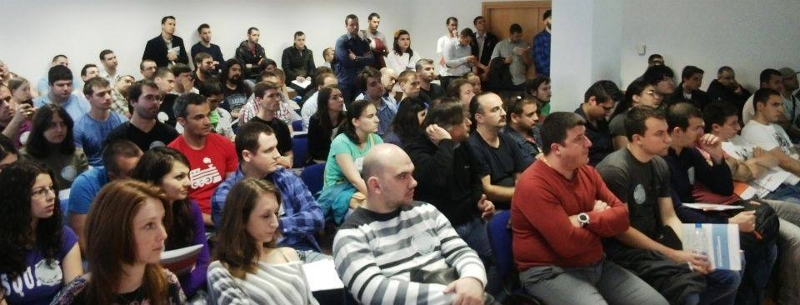 This is what my hall looked like at around 10:00 and stayed pretty much the same
during the entire day.
This is what my hall looked like at around 10:00 and stayed pretty much the same
during the entire day.
Speakers at hall Rhodopi were (in order of appearance)
- Delian Delchev talking about the JavaScript revolution taking over the world and how this language has become the most widely used programming language in the world.
- Haralan Dobrev with some tips about development workflows, git, continuous integration and unit testing.
- Yoga for Geeks during the lunch break.
- Boyan Dzhumakov with topics about home automation and Internet of things, who demonstrated his bed side lamp controlled via a light sensor and Arduino.
- Neven Boyanov continuing on the hardware topics with comparison of ATmel, Arduino and Raspberry Pi and showing more examples of small programmable devices.
- Angel Todorov from Infragistics with a very interesting talk about JavaScript instrumentation for performance analysis. A very cool presentation and you should definitely check out his cheetah.js framework.
- Krasimir Tsonev with AbsurdJS - a JavaScript library with superpowers. Teaser: Krasimir is also publishing a book caled Node.js Blueprints.
- Vasil Kolev with a talk about security and web service design and how most of the web is doing it wrong :).
Unfortunately there is no video or audio recording available. If you find some of the talks interesting and would like to get more info about it let me know. I will ask the presenters to share their slides or give more details where possible.
Don't worry if you've missed the Web Summit in Sofia. There will be another one in the autumn, held at Veliko Tarnovo. For more info please subscribe to the newsletter.
There are comments.
Page 1 / 2